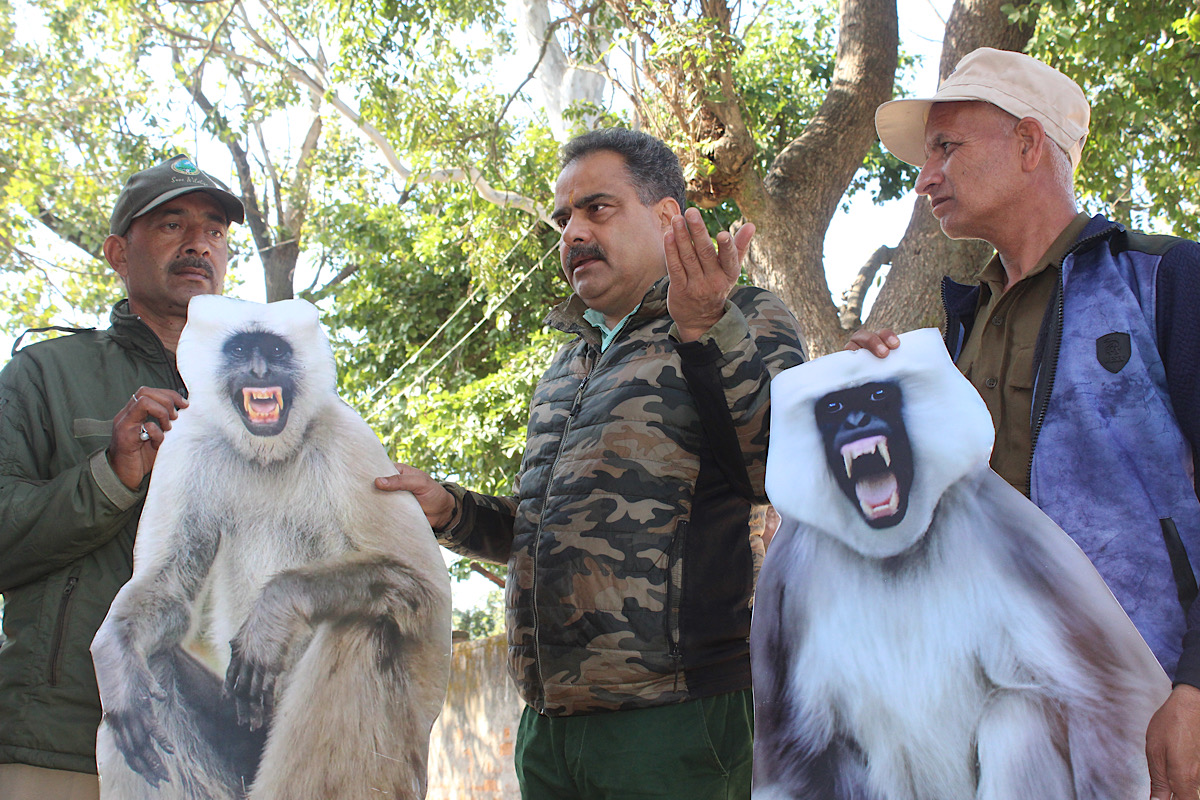LG calls effective for steps to wipe out terrorism from Jammu
Lt. Governor Manoj Sinha, on Thursday, stressed strengthening border security against asymmetric threats due to the porous border with riverine and difficult mountain ranges.
Amid fear of monkeys expanding their territory in the agriculture areas on the foothills of Shivaliks in Jammu division, many farmers in 1590 affected villages have either migrated to towns in search of jobs or shun growing the traditional crops that are destroyed by wild simians.

Officials of wildlife protection department (Photo:SNS)
Amid fear of monkeys expanding their territory in the agriculture areas on the foothills of Shivaliks in Jammu division, many farmers in 1590 affected villages have either migrated to towns in search of jobs or shun growing the traditional crops that are destroyed by wild simians.
The problem is severe in more than 250 villages of Jammu, Udhampur and Reasi districts where a large number of agriculturists with small landholdings have abandoned their fields and taken up the job of labourer in various government sponsored schemes.
Advertisement
Officials of the Forest and Wildlife Protection Departments have started putting up cut-outs of langurs to scare the monkeys. But the idea has not worked on expected lines as monkeys in some villages pulled down such cut-outs.
Advertisement
Some enterprising people particularly in the Reasi and Udhampur districts have started cultivating lemongrass and such like crops from which simians keep themselves away.
Nearly one lakh farmers, fruit and agriculture, in nine of the ten districts of the Jammu division are sufferers of monkey menace.
Out of fear of monkey attacks, women and children fear venturing out of their houses in the Chirayai, Jaganoo, Thial, Jib, Muttal, Sunderani, Kauh, Kaghote, Ramnagar, Chenani, and Majalta villages of Udhampur. Similar is the situation in the Pouni and Panthal blocks of the Reasi district.
It is estimated that monkeys used to destroy crops and fruits worth Rs.40 crore annually over an area of more than 33,000 hectares before some affected farmers switched over to cropping of lemongrass, lavender and aloe-vera.
Some senior officers like Indu Chib, who during her tenure as deputy commissioner of Reasi, brought out innovative ideas to counter the monkey menace and also improve the economic condition of residents of the affected villages.
The farmers in the areas like Pouni and Panthal, which are now growing lemongrass or aloe-vera etc earlier used to cultivate organic vegetables but due to monkey menace their land was lying idle. What Indu Chib did was to motivate the farmers to grow lemongrass to fight the monkey menace.
In a bid to empower women of the areas on the foothills of the Vaishnodevi shrine, she got women self-help groups organised and these groups have started packaging and marketing lemongrass oil which also helps farmers fight the monkey menace.
One of the reasons for monkeys heading towards the agriculture areas from their natural habitat in the wild is due to the massive construction activity that is shrinking the forest area.
Experts say that the monkey menace is a complex problem that needs a coordinated effort by the agriculture, horticulture, animal husbandry, forest, wild life protection departments and the agriculture university here to work out urgent short term measures to provide immediate relief and also needs a framework for long term and lasting solution. To strike a balance, ecological solution is the only answer.
Integrated farming approach under which root crops that are not damaged by monkeys are cultivated in the affected areas. These crops include, ginger, turmeric, marigold, lime, lemon, Bael, lemongrass and Lavender etc, they suggest.
Advertisement